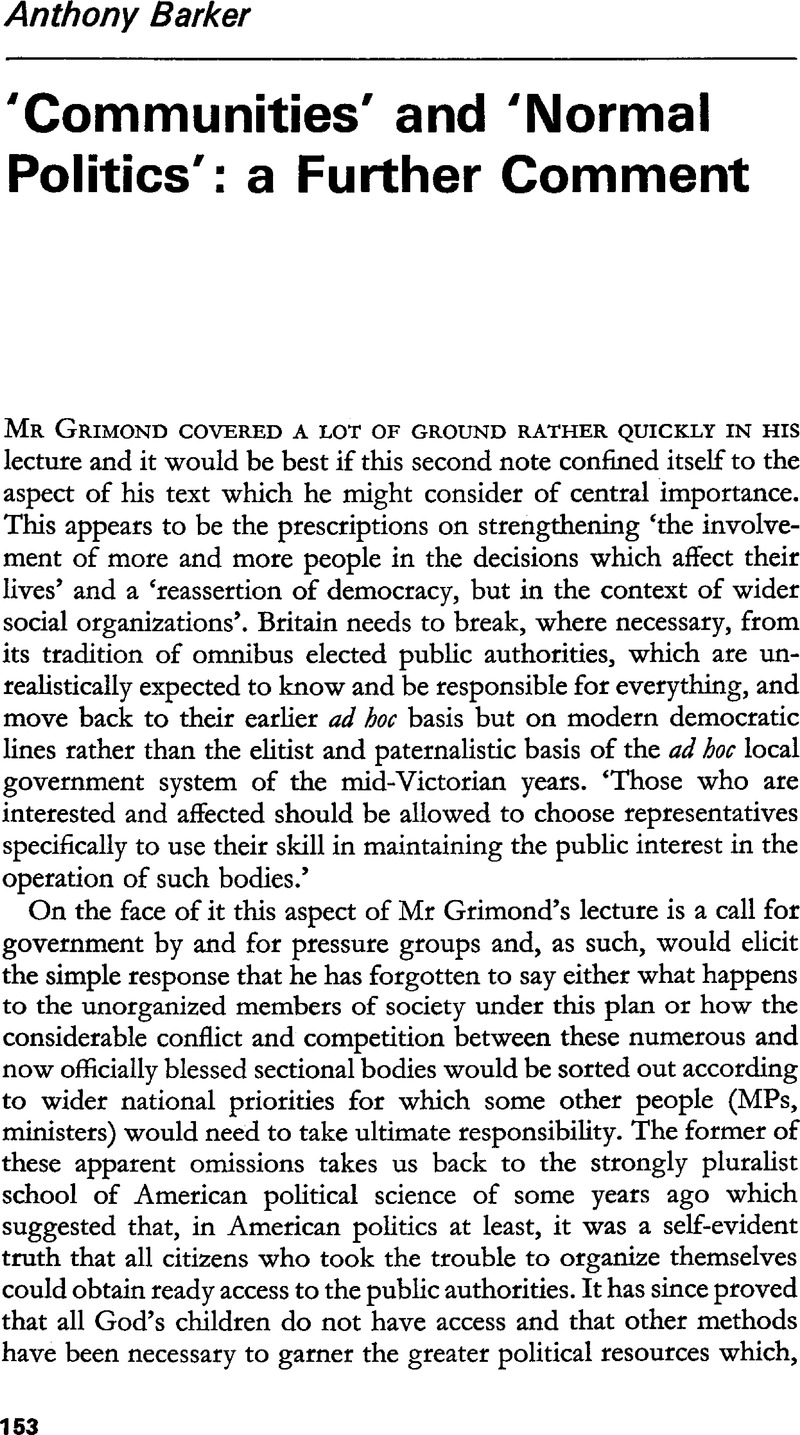No CrossRef data available.
Published online by Cambridge University Press: 28 March 2014

1 Megill, K. E., The New Democratic Theory, Free Press, New York, 1970, p. 101.Google Scholar Quoted by Barry, B. M. in ‘The Political Problems of the Corporate Society and their Solutions’ (unpublished paper, Department of Government, University of Essex, 1970, p. 54).Google Scholar
2 Arnstein, Sherry, ‘A Ladder of Citizen Participation’ in the Journal of the American Institute of Planners, 07 1969, pp. 216–22.CrossRefGoogle Scholar Another broad typology is Burke, Edmund, ‘Citizen Participation Strategies’ in the Journal of the American Institute of Planners, 09 1968, pp. 287–94.CrossRefGoogle Scholar
3 Crosland, C. A. R., Labour Weekly, 31 12 1971 , p. 4.Google Scholar
4 Crosland, C. A. R., A Social Democratic Britain, Fabian Society, Tract 404, London, pp. 12–15.Google Scholar
5 Almond, G. and Verba, S., The Civic Culture, Princeton University Press, 1963;CrossRefGoogle Scholar Butler, D. and Stokes, D., Political Change in Britain, Macmillan, London, 1969;Google Scholar Goldthorpe, J., et al., The Affluent Worker (three volumes), Cambridge University Press, 1968–69 Google Scholar. Also, no suggestion of such an active demand was traced in the responses of non‐ministerial MPs to a survey specifically designed to elicit their stimuli about public affairs, notably from their constituencies. See Barker, A. and Rush, M., The M.P. and his Information, Allen and Unwin, London, 1970 Google Scholar for ‘Political and Economic Planning’ and ‘The Study of Parliament Group’. On the problems of detecting such demands see Louis Moss, ‘Measuring the “Demand for Participation” in the Context of Constitutional Change’, (preparatory paper for the Crowther Commission on the Constitution, October, 1969).
6 This comment does not overlook the very interesting advances made by the local amenity society movement in Britain. Lacking the space in this present note for a commentary on the style and apparent goals of many of these groups, the author would offer only the brief comment that they appear to be, on the whole, ‘consumerist’ or demand‐making bodies rather than potential regular partners of public authorities. But the political and social contribution of these bodies is developing and requires monitoring and analysis. Mr Crosland makes some cogent points (from his particular party's viewpoint) in his Fabian Tract 404.
7 Pateman, Carole, Participation and Democratic Theory, Cambridge University Press, 1971.Google Scholar
8 See, for example, Clark, Kenneth and Hopkins, Jeanette, A Relevant War against Poverty, Harper, New York, 1968–69.Google Scholar (Harper Torchbook edition with apparently new preface, 1970.)
9 Marris, P. and Rein, M., Dilemmas of Social Reform, Atherton, New York, 1967.Google Scholar
10 See, for example, Altshuler, A., Community Control, Pegasus, New York, 1970.Google Scholar
11 Brown, T., Vile, M. J. C., Whitmore, M. F., ‘Community Studies and Decision‐Taking’ in British Journal of Political Science, Vol. 2, No. 1 (01 1972).CrossRefGoogle Scholar